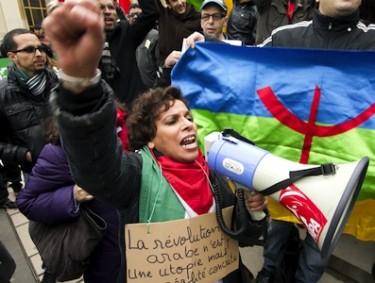This post is part of our special coverage Morocco Protests 2011 [1].
After a visit to France, Morocco's King Mohammed VI returned to the Royal Palace in Casablanca to announce [2] [fr] the initiation of an Economic and Social Council on Monday, February 21, 2011.
 [3]
[3]Protesters gathered in solidarity with Moroccan people in Paris, France. Photo by sebastien rabany, copyright Demotix (20/02/2011).
He explained:
Si Nous donnons le coup d’envoi de ce Conseil aujourd’hui, c’est parce que Nous nous sommes constamment refusé à céder à la démagogie et à l’improvisation dans Notre action visant à consolider notre modèle singulier de démocratie et de développement.
Chapter 9 of the 1996 Constitution of the Kingdom of Morocco in fact first established [4] the existence of the Council:
Article 94: The Economic and Social Council may be consulted by the Government, as well as the House of Representatives and the House of Counsellors on all matters of economic or social nature. It shall give its opinion on the general guidelines pertaining to the national economy and training programmes.
However, King Mohammed VI did not instigate the development of the council until October 2008, as detailed in his address [5] to the two chambers of the Moroccan Parliament at the time:
My decision to set up the Economic and Social Council is in line with our standard policy to press ahead with comprehensive institutional reform.
I hope the setting up of this development-oriented constitutional body will boost national advisory institutions which have proved their efficiency and credibility in both the political and legal domains.
I should like this council to be set up as soon as possible and I therefore invite the government to prepare the organic law for its constitution and to submit it to Parliament before the end of the current session.
On May 5, 2010, Siham Ali, for website Magharebia [6], reported that, “Twenty-four unions will eventually make it into the CES: 12 chosen by the prime minister, and six each selected by the two chambers of Parliament.”
According to Ali: “There have even been many calls for the Economic and Social Council to replace the Chamber of Councillors.”
The King confirmed in his speech on Monday that, “By welcoming the pluralistic composition of the Council who counts among her socio-economic fabric of associations and scientific and intellectual skills, we affirm that we all take for equal members of this institution.”
Twitter updates in response to the latest speech vary from support to utter condemnation:
@mhantirah [7]: King Mohammed VI speech is reminiscent of Mubarak's 1st speech. They don't get it
@freearab [8]: Should the King of #Morocco rule? or should the prime minster rule as in the UK.
@mokromike [9]:The King has showed himself a real dictator. We Moroccans despise him and his family. M6 DÉGAGE !!
@NickKristof [10]: The Arab leader who handled protests most wisely is King Mohammed VI of Morocco. He treated them as a sign of progress.
Laila Lalami, in an article in Foreign Policy [11], highlights that in his speech, “the king made no reference to the Feb. 20 movement or to the protests.”
This post is part of our special coverage Morocco Protests 2011 [1].